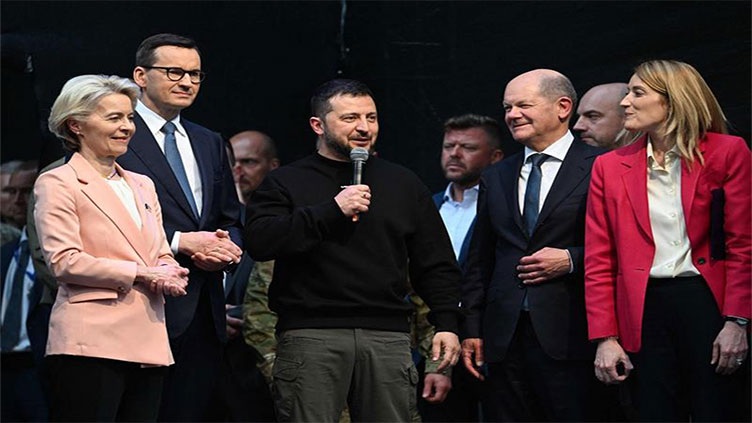A framework to track the casualties and damage caused by Moscow’s soldiers was presented by European leaders on Tuesday as they met in Iceland for a two-day summit. They also vowed to hold Russia accountable for its conflict against Ukraine.
At a rare gathering of the Council of Europe (CoE) rights council in Reykjavik, leaders from several countries, including the German Chancellor Olaf Scholz, French President Emmanuel Macron, and British Prime Minister Rishi Sunak, reaffirmed their support for Ukraine.
Volodymyr Zelenskiy, the president of Ukraine, joined them through video link. He had just returned from a trip to the capitals of Europe where he was trying to gather more supplies and equipment for a counteroffensive against Russian forces.
Zelenskiy used the occasion to draw attention to Kyiv’s assertions that it had used recently installed Western help defences to shoot down Russian hypersonic missiles. He told the summit that it demonstrated the nation’s capacity for anything when it was united.
“A year ago, we were not able to shoot down most of the terrorists’ missiles, especially their ballistic ones,” Zelenskiy remarked. “And now I have a question. Is there anything we can’t do if we can do this?
Although it has destroyed scores of towns and cities with its air strikes and artillery since the invasion started in February of last year, Russia has denied intentionally hitting civilian targets in Ukrainian cities.
A new Register of Damages, a method to record and document evidence and claims of damage, loss, or injury allegedly sustained as a result of the Russian invasion, was introduced at the Reykjavik meeting.
The meeting also aimed to discuss other issues, such as the suffering of the thousands of Ukrainian children who have been illegally deported to Russia or Russian-occupied territory since the war began. Kyiv and its allies have condemned these deportations.
“This is the time to fight back. Democracies like ours need to become more resilient so that we can compete with and outperform those that promote instability, according to Sunak.
We must take this war’s lessons to heart and be ready to deal with threats to our societies before they get too serious. We will hold Russia accountable for the horrific war crimes that have been done.
Scholz echoed such comments when he stated that the council was crucial “to punish the war crimes of the Russian occupiers and to demand accountability for the enormous damage that Russia inflicts on Ukraine day after day.”
According to Macron’s office, the council is considering how the Council of Europe Development Bank (CEB) could assist in addressing the needs of Ukrainians who are struggling.
The parliament, government, and supreme court websites, as well as other public and private websites in Iceland, were temporarily targeted by cyberattacks before to the arrival of the leaders.
In a Telegram thread, the pro-Russian hacker group NoName057 took credit for the attacks, highlighting in particular the Council of Europe gathering and Zelenskiy’s address.
Since the Council of Europe was established following World War Two, there have only been four summits.
The Strasbourg-based European Court of Human Rights, where citizens can sue governments for violating human rights, upholds its democratic principles.
The day after Russia invaded Ukraine, its membership was suspended. Then, hours before a vote to expel it, Moscow quit the organisation.
After failing to carry out a 2019 court decision to free imprisoned businessman and philanthropist Osman Kavala, Turkey now risks being expelled from the CoE.
At the summit, Sunak also spoke with Ursula von der Leyen, president of the European Commission. According to a readout from Sunak’s office, the leaders decided to increase immigration cooperation by creating a new cooperative agreement between British authorities and the European Border and Coast Guard Agency.
Sunak will also argue for changes to the European Court of Human Rights’ authority to halt flights from the United Kingdom carrying illegal immigrants to Rwanda, which has been denounced as harsh by opponents, charities, and religious leaders.
















